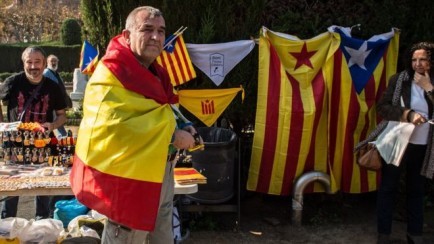
Catalans will vote on October 1 on whether the region should break away from Spain. The problem is, the result will not be binding.
Politics has the propensity to get messy quickly, perhaps more so in Spain than in most other European nations. Decades of fascist Franco rule kept a lid on regional tensions and whims by the use of force; and since 1976 Spain’s existence and progress as a successful European state has hinged largely on the promise and reality of an improved standard of living for all…
But since the economic crash of 2008, rumblings of discontent in Spain’s wealthiest region – Catalonia – grew louder, and despite the country’s economic revival in recent years, those calls for secession have become stronger, finding an audience among younger Catalans who believe that independence will strengthen their identity and job prospects.
Madrid, however, sees things differently. Moored off the coast of Barcelona right now are two Guardia Civil ships, ready if needed to dock at the city to potentially prevent voters from going to the polls. This sounds, on paper, like a disastrous way to manage ‘democracy’, but there are equally valid criticisms aimed at the Catalonia government for pushing through with such a potentially volatile vote even though it has not been granted by the Spanish government. In other words, the referendum is illegal, and thus some argue that participation in it is also illegal.
So what are both sides afraid of?
Catalans fear that Madrid’s behaviour is a worrying display of anti-democratic intent; of a government fearful of offering its people the choice for self-determination – which is strongly embedded in the psyche of many Spaniards due, largely, to the country’s recent history of fascism.
For Madrid, the fear is that if Catalans do choose to break away it could set a precedent for other regions – namely Basque and Galicia – to seek to do likewise. If those three leave, what remains of Spain?
The irony here of course is that polls conducted by Catalonia’s very own government put the number of people who would be for independence at less than half. In other words, it is likely that the secession vote would fail, and the status quo would remain.
But even so, the majority of Catalans at least want to be given the option to vote – it is Madrid’s refusal to sanction it that is stirring up passions, which plays into the hands of the staunch secessionists who, as we saw with the Vote Leave party in Brexit, don’t have to deal in facts, just hyperbole.
The vote on October 1 may well go ahead peacefully, or there may be trouble, or it may not proceed at all. The outcome of the referendum is, however, secondary right now to the harm that the rhetoric is doing to Spain’s political landscape – a landscape that is already fragile under a minority coalition government following last year’s general election.
As things stand, it would seem that minor scuffles ahead of a non-binding vote will be the most likely outcome. Some will hope that the “result” shows a Catalan population in favour of remaining in Spain, if only because this will then douse the passions of those who would wish to pull away.
A vote largely in favour of leave, however, would really put the cat among the pigeons.
 en
en



 Vlaams-Nederlands
Vlaams-Nederlands
0 Comments
Leave a Comment
DISCLAIMER
The opinions and comments expressed by contributors to this Blog are theirs alone and do not necessarily reflect the views of VIVA Homes Under the Sun Ltd, any of its associated companies, or employees; nor is VIVA to be held responsible or accountable for the accuracy of any of the information supplied.
Have you got something to say?